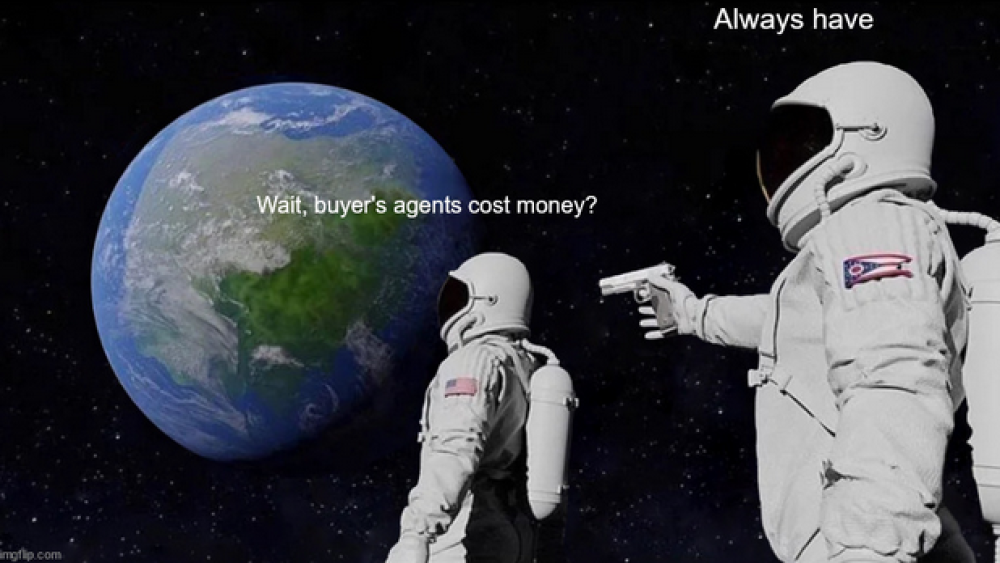It’s been all the buzz this weekend, and has kind of done me a favor, as it’s helped me keep in touch with a lot of friends and past clients, by having them ask me about it. Yes, I’ve heard about it. The real estate community has been, ah, shall we say “buzzing” about it for months now.
Of course, I’m talking about the lawsuit against the National Association of Realtors (NAR), of which I am a member. Or, as CNN put it, “The 6% commission is gone”, a headline that shows a shocking lack of understanding of what happened.
Assuming the settlement gets court approval, I do not think it was an unsurprising result.
I can’t talk about the lawsuit specifically

A picture of me, obviously, taken yesterday or something
Image by AllClear55 from Pixabay
Which is to say, I haven’t been officially gagged or anything, but I do not feel proficient enough in the content of the lawsuit to be any kind of expert on it. Realtors have been talking about this for quite awhile now. My brokerage, Keller Williams, reached a settlement last month that is also pending court approval.
In general terms, I can tell you that my understanding of the lawsuit. So, in the expert opinion of a guy who’s only heard about the lawsuit from secondary sources and hasn’t looked into the details: it was that it centered on the lack of transparency in Realtor compensation. So to start, let me give you a quick overview of how Realtor compensation was handled, and where I can see some potential problems in the conversations that surrounded it.
How compensation works (for now)

My fingernails look great in this
Image by aymane jdidi from Pixabay
In Utah’s Exclusive Right To Sell document, the agreement that makes me your Listing Agent, and you my Principal, there is language in which a commission is agreed upon. This is generally X dollars or X percentage of the sale price paid to the Listing Brokerage. In the same section, there is language that says that the seller also authorizes the LIsting Brokerage to pay X dollars or X percent of the sale price to the Buyer’s Brokerage (not “agent”, but the distinction isn’t important for our purposes in this article.)
This agreed-upon disbursement was listed on the MLS as Buyer Agent Commission (BAC) when I started in 2014, but recently was updated to the more accurate Buyer Broker Commission (BBC). Of course, we’d have to be scared that the next lawsuit is with the British Broadcasting Company, but BBC won’t be around much longer. Will British television be around much longer? Also unclear.
Your reaction to this might be, “Why should the seller pay for the buyer’s agent?” which is fair enough. Essentially, it’s marketing. It’s beyond the scope of this article to get into the details, but for now, the simplified version is: a seller sees all concessions as a loss of their revenue. To a non-cash buyer (which is the vast majority of them), price reduction makes their monthly payment lower, but covering up-front costs (such as their agent’s commission) makes them more able to acquire the home at all.
You, my intelligent and probably good-looking reader, may have just said, “Monthly payment affects the buyer’s ability to buy the home!” That is, of course, correct, but not the topic of this article. These are general rules; we’ll break it down into tasty granularity some other time.
The point is that the BBC increases the pool of buyers who can afford your home dramatically, especially in starter and mid-range prices.
There’s a lot more to discuss about BBC and how it works (again, we’re talking about compensation; I have no idea how or why British television works), but this implementation of it looks like it’s going away soon, so much more exploration of it would just be academic.
No, Buyer’s Agents weren’t free.
First, a confession: when I first started, I thought of myself as a buyer agent as “free.” So if someone really dedicated to me wants to trawl my social media over the last ten(!) years, you can probably find something to throw back in my teeth.
Whether or not you find something to blackmail me with, “free” is not how it works. The Buyer Broker Agreement, the document that makes me your Buyer Agent, and you my Principal, includes language that says the buyer is responsible for paying their Brokerage X dollars or X percentage of the purchase price at closing. However, it includes language that clarifies that the seller may cover some or all of that commission, in which case the buyer brings nothing additional to the table.
Many–dare I say most–Buyer Agents didn’t enforce that clause. Rather, they took whatever commission the seller offered and would just rant and gnash their teeth in online Realtor groups about greedy listing agents. I think this is part of the problem, as we’ll explore.
Several years ago, I realized that advertising myself as “free” was not only a disservice to myself and the industry, but it put me in a weird position ethically. There were 3 major problems with a buyer agent valuing themselves as “free”
- It wasn’t true. Even if they didn’t add to the buyer’s closing costs, the buyer was bringing all the money to any given transaction.
- It gave them a financial incentive to avoid homes that offered low compensation to buyer agents, and toward homes that offered high compensation.
- It led to some buyer agents attempting to get sellers to make concessions for commission that weakened the offer, and put the Buyer Agents at cross purposes with their client.
Realizing this, I stopped advertising myself as “free” and included in all my buyer consultations the explanation I’ve just given here.
To me, this is the main good point coming out of this settlement. First, I feel vindicated. I cannot express how difficult it makes it for all of us when Buyer Agents say we’re “free”. I’m uncontainably happy that it’s going extinct this year. Second, and far less importantly, it looks like there will be more transparency facing the consumer about how buyer agents get compensated industry-wide.
Are 6% commissions gone?

You know this one is high art because she’s not a person, but a concept of a pricing structure
Image by Gerd Altmann from Pixabay
Oh, CNN. Never change. Let’s answer the question, since I kind of set it up in the intro:
The answer is that question makes no sense, as realtors have been able to set their own prices for, I believe, the entire lifespan of the industry. One of the first things they beat into you in real estate school is the fact that there is no fixed commission. The range of commission on the MLS drifts mostly between 2% and 3% on BBC, and anecdotally I’ve heard listing agents charging between 1% and 3%, but I’ve seen wild swings in commission. I cannot express how far out of their way every Realtor group goes to constantly remind all of us that commission isn’t fixed. I’m pretty sure if your kid has a slumber party and another Realtor’s kid attends, you should say, “Tell your mom there’s no fixed commission” just to be safe. Does this imply there were problems in the past? I think so, maybe. But from my own experience, I can tell you that at least since 2014, this has been made abundantly clear to Realtors.
The BBC is one lever of many that is agreed upon between seller and listing agent to get the house sold, and in the same way, listing commission is a lever listing agents use to entice more clients.
The market forces that make these things useful still exist, so I’d be surprised if this were the “seismic shift” the headlines are predicting.
What’s actually changing?
Realtors are now required to be clear that commission is negotiable, and to make explicit that Listing Broker commission is being shared with the Buyer Brokerage. In my opinion (which I feel inspired to tell you does not represent NAR or the Utah Association of Realtors), the existing forms already did that, but I can’t speak for what’s happening outside of Utah, which often sounds to me like a lawless swamp. If you read this in Michael Scott’s voice, we should be friends.
I know a few specifics of what’s going to change, but at the time I’m writing this, I’m a couple hours out from a large Zoom meeting in which Utahn realtors are getting an update on what the settlement means.
On top of that, this article is quite long enough, so I’ll do a Part 2 later. Probably nexweek, unless something hilarious happens in the meantime.
See you then!





